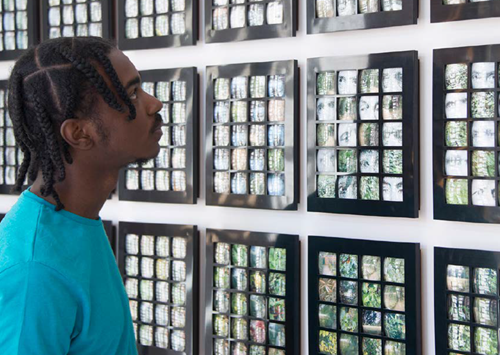 The cultural sector (creative industries, tourism, and sport and leisure) supports around 15,000 jobs (15,750 when sole proprietors are included) through 1,380 organisations, and generated a value in gross value added (GVA) terms of an estimated £432m in 2018. This means that at least 12% of employment in Shropshire can be classed as cultural, with the sector contributing around 7% to the overall economy. Businesses are predominantly small, and self-employed enterprises are common.
The cultural sector (creative industries, tourism, and sport and leisure) supports around 15,000 jobs (15,750 when sole proprietors are included) through 1,380 organisations, and generated a value in gross value added (GVA) terms of an estimated £432m in 2018. This means that at least 12% of employment in Shropshire can be classed as cultural, with the sector contributing around 7% to the overall economy. Businesses are predominantly small, and self-employed enterprises are common.
This includes a strong visitor economy sector, which is forecast to grow by 74% in Shropshire between 2012 and 2036, taking the GVA to £367m. Despite a reduction in employees in creative industries over the past few years, this sector is forecast to grow even more strongly over the time period, by 174%, generating £331m by 2036, generating employment opportunities in higher value, professional jobs. The value of the natural and historic heritage offer is significant, with the economic return of visits to the environment estimated to be £100m per year. These are therefore important sectors for the local economy and should be supported going forward.
Before the pandemic there were over 13 million visitors a year to Shropshire, but the county ranked 40th out of the 50 most visited counties in the UK, and the spend per trip was around £10 per person per trip lower in Shropshire than the national average. This means that there’s potential to grow the market, even without increasing the number of visitors.
 Culture is important to local people as well as visitors, with 70% of Shropshire residents visiting the natural environment at least once a week in 2018/19, which had increased by around 39% since 2009/10. More than half of Shropshire residents had attended an event, performance or festival in 2018/19, in line with the national average; 72% had attended an arts event, participated in an arts activity or visited a museum or gallery, and 36% had used a public library service. Sports and leisure are also important, with 61% of adults in Shropshire being physically active and achieving the recommended 150 minutes or more per week.
Culture is important to local people as well as visitors, with 70% of Shropshire residents visiting the natural environment at least once a week in 2018/19, which had increased by around 39% since 2009/10. More than half of Shropshire residents had attended an event, performance or festival in 2018/19, in line with the national average; 72% had attended an arts event, participated in an arts activity or visited a museum or gallery, and 36% had used a public library service. Sports and leisure are also important, with 61% of adults in Shropshire being physically active and achieving the recommended 150 minutes or more per week.
More information about the importance of culture can be found in Appendix 1- The Cultural Sector in Shropshire: Key Metrics. March 2021.
Impact of the coronavirus pandemic
The coronavirus pandemic has had far reaching consequences, which will influence the delivery of priorities over the period of this strategy. Impacts have affected people’s physical, mental and financial wellbeing, and restrictions have also caused societal changes, some of which may not revert to pre-pandemic norms once restrictions are relaxed. Impacts include addressing increasing inequality across society, and needs can be summarised as:
- Increased support for social isolation and mental ill health
- Increased support for the unemployed
- Support for businesses and the self-employed
- Prioritisation of scarce public funding
- Support for those falling behind in education, increasing inequality for the most disadvantaged
- Increased need for online resources and entertainment
- Support for the digitally excluded - 50% of over 75s, 30% of 65-74-year-olds and 2% of households with children don’t have access
There’s a real need to have fun and resume activities that make people happy and connected, and to improve quality of life. This is reflected in the priorities of this strategy.
The increase in homeworking, a growing number of people moving to Shropshire to improve their quality of life and unemployment mean that cultural activities closer to home will be important, and this will include a focus on activities outside Shrewsbury.
However, the coronavirus pandemic has reinforced the importance of culture in our lives and has helped accelerate online streaming of cultural activities, encouraged new ways of working and has helped break down barriers to engagement by using new technology. The challenge is to harness these positive aspects, whilst addressing some of the issues outlined above.
Other considerations
 The Integrated Care System aims to join up primary and preventative health and care approaches to increase health and wellbeing. The role of culture in this needs proactive consideration as the new system is developed.
The Integrated Care System aims to join up primary and preventative health and care approaches to increase health and wellbeing. The role of culture in this needs proactive consideration as the new system is developed.
The impact of leaving the European Union on tourism and other cultural sectors has yet to be realised, due to the coronavirus lockdown. This will emerge within the next few years and will impact on the actions needed in the implementation plan.
Over the lifetime of this strategy there are some other potential initiatives, which, if introduced, could impact on how we see and get involved in culture, including:
- The introduction of 5G and 6G connectivity
- The development of game-changing new technologies
- Potential for the introduction of ‘universal basic income’
- Potential for the introduction of reduced working hours, such as a four-day week
As it’s difficult to predict when, or indeed if, these will be introduced, and the impact they’ll have if they are, this cultural strategy will be reviewed after five years, and amended to take account of circumstances at that time. In the meantime, the three-year implementation plan will be a working document that can be updated as necessary to take advantage of new opportunities or address new concerns.
What is culture?
 At one level, ‘culture’, is about those special places to go and things to do that attract and inspire visitors, both local and from further afield. Culture includes arts and crafts, museums, heritage, history, archaeology, geology, architecture, open spaces, countryside recreation, sport, play, hospitality, cafes and restaurants, pubs, visitor attractions and locally produced food and drink. It’s that unique blend of experiences that gives a place its own sense of spirit and identity.
At one level, ‘culture’, is about those special places to go and things to do that attract and inspire visitors, both local and from further afield. Culture includes arts and crafts, museums, heritage, history, archaeology, geology, architecture, open spaces, countryside recreation, sport, play, hospitality, cafes and restaurants, pubs, visitor attractions and locally produced food and drink. It’s that unique blend of experiences that gives a place its own sense of spirit and identity.
Culture is also about much more than this. It’s about what’s special to us as a community and as individuals. It can characterise:
- Our sense of self – by developing our spiritual, intellectual and emotional wellbeing and connection to others
- Our sense of place – and the way we feel about places to make them somewhere we want to live, work and visit
- Our sense of purpose – by connecting us to traditions, beliefs, values and shared stories
It’s about what makes Shropshire special and impacts on every aspect of our lives, strengthening the economy, aiding health and wellbeing, and valuing and caring for the environment.
Cultural map of Shropshire
The following map shows the spread of cultural attractions across the county.
 The cultural sector (creative industries, tourism, and sport and leisure) supports around 15,000 jobs (15,750 when sole proprietors are included) through 1,380 organisations, and generated a value in gross value added (GVA) terms of an estimated £432m in 2018. This means that at least 12% of employment in Shropshire can be classed as cultural, with the sector contributing around 7% to the overall economy. Businesses are predominantly small, and self-employed enterprises are common.
The cultural sector (creative industries, tourism, and sport and leisure) supports around 15,000 jobs (15,750 when sole proprietors are included) through 1,380 organisations, and generated a value in gross value added (GVA) terms of an estimated £432m in 2018. This means that at least 12% of employment in Shropshire can be classed as cultural, with the sector contributing around 7% to the overall economy. Businesses are predominantly small, and self-employed enterprises are common. Culture is important to local people as well as visitors, with 70% of Shropshire residents visiting the natural environment at least once a week in 2018/19, which had increased by around 39% since 2009/10. More than half of Shropshire residents had attended an event, performance or festival in 2018/19, in line with the national average; 72% had attended an arts event, participated in an arts activity or visited a museum or gallery, and 36% had used a public library service. Sports and leisure are also important, with 61% of adults in Shropshire being physically active and achieving the recommended 150 minutes or more per week.
Culture is important to local people as well as visitors, with 70% of Shropshire residents visiting the natural environment at least once a week in 2018/19, which had increased by around 39% since 2009/10. More than half of Shropshire residents had attended an event, performance or festival in 2018/19, in line with the national average; 72% had attended an arts event, participated in an arts activity or visited a museum or gallery, and 36% had used a public library service. Sports and leisure are also important, with 61% of adults in Shropshire being physically active and achieving the recommended 150 minutes or more per week. The Integrated Care System aims to join up primary and preventative health and care approaches to increase health and wellbeing. The role of culture in this needs proactive consideration as the new system is developed.
The Integrated Care System aims to join up primary and preventative health and care approaches to increase health and wellbeing. The role of culture in this needs proactive consideration as the new system is developed. At one level, ‘culture’, is about those special places to go and things to do that attract and inspire visitors, both local and from further afield. Culture includes arts and crafts, museums, heritage, history, archaeology, geology, architecture, open spaces, countryside recreation, sport, play, hospitality, cafes and restaurants, pubs, visitor attractions and locally produced food and drink. It’s that unique blend of experiences that gives a place its own sense of spirit and identity.
At one level, ‘culture’, is about those special places to go and things to do that attract and inspire visitors, both local and from further afield. Culture includes arts and crafts, museums, heritage, history, archaeology, geology, architecture, open spaces, countryside recreation, sport, play, hospitality, cafes and restaurants, pubs, visitor attractions and locally produced food and drink. It’s that unique blend of experiences that gives a place its own sense of spirit and identity.